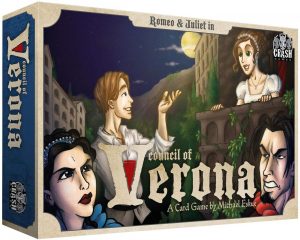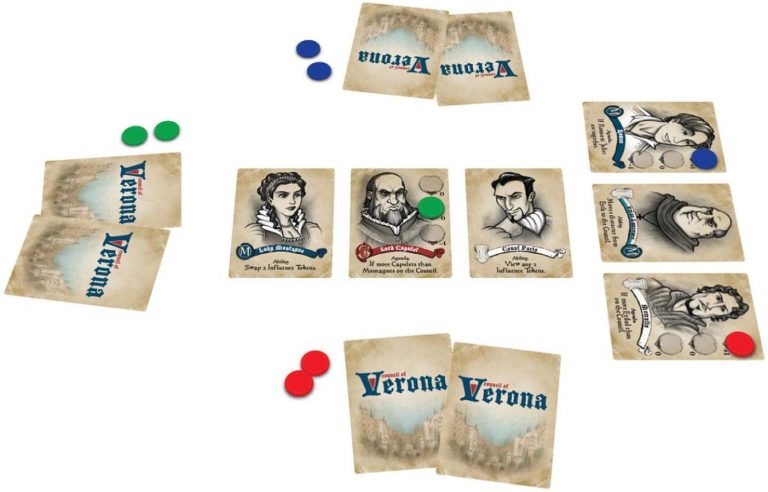Council of Verona Review
An underappreciated filler

By MARK WILSON

Year Published: 2013
Players: 2-5
Playing Time: 20 Minutes
If I were given to subjective hyperbole, my reviews would undoubtedly have a number of statements that are patently indefensible, yet vindicating to those who agree with me. For example, Council of Verona may very well be my favorite filler game. If I allowed myself to take that sentiment too far, I might call it something along the lines of…
The Greatest Filler Game Ever
Too bold a claim? Obviously, but buckle your seat belts and don your best Elizabethan garb, for I aim to convince you that this is a hidden gem that deserves more attention than it gets.
A Note on The Poison Expansion
I like this game as-is, but imo it truly becomes special with the Poison Expansion. This expansion is one of the most lightweight additions in all of board gaming, but rounds out the base game in a way that makes it feel complete. If you’re buying this game, or already own it, find this expansion and add it. If your experience is anything like mine, you’ll never want to play without it.
This review – and my “best filler ever” hyperbole – assumes the presence of this expansion. Most of the comments remain true without it, but a definite few flaws present themselves without the expansion that I’ll note near the end.
If memory serves, the 2nd edition of this game comes with the Poison expansion by default, so you may not have to hunt it down.
Council of Verona – The Premise
You are dealt a card and draft the rest of your hand from a small pool of cards. Every card either has an agenda (which can score points) or an ability (used to manipulate the tableaus you’ll build). On your turn, you place a card either in Exile or on the Council, optionally use the ability (if it’s an ability card played) and optionally bet one of your tokens (worth varying amounts of points) face down on an agenda slot. You try to manipulate the board to have your agenda(s) be true at the end of the game to score the most points.
Abilities generally let you maneuver cards from one area to another, aiding and hindering certain agendas, or swapping tokens, either to move your tokens off of a losing bet, move an opponent’s token onto a losing bet, or simply to sow some chaos and mess up everyone’s plans.
The poison expansion adds poison and antidote tokens to your betting chips, giving you the option to kill or save those who serve your agenda(s) or are in the way of it.
The agendas are lightly thematic and tied to the Romeo & Juliet play, and the card art is amusing and functional.
Luck? Strategy? Yes.
This is a game that’s hard to plan out in advance, so there’s a lot of reactionary actions taken. However, that doesn’t mean it’s devoid of strategy. A lot of this means keeping your options open to be able to take advantage of tableau states later in the game that you can’t anticipate early on. Other times it involves pairing cards in your draft that synergize well with one another toward a particular agenda. Prudent use of your tokens is also crucial, and can involve mini-bluffs and double bluffs especially once poison and antidote tokens are added.

A Comparison to Love Letter
I enjoy and own Love Letter, but I think a comparison with it will aid my explanation of Verona, which I prefer from among the two.
Similar to LL, there are elements of randomness mixed with occasionally meaningful strategic choices that are further rewarded by watching how others are playing. Neither is super deep, but we’re talking about ~20 cards making up the entirety of the game. For what you get, both have a pleasant amount of gaming.
However, Verona does a few things slightly better imo. The decisions aren’t as binary as many in LL, which makes them more interesting. Additionally, you have a few things to do on each turn (play a card in one of two locations, potentially perform an ability and choose how to use it, and place a token). So your turns feel more exciting. Lastly, it plays more quickly than a full game of LL. I don’t mind longer game times, but when the itch a game scratches and the experience it delivers are similar, length can be a useful tiebreaker.
Without the Poison Expansion
Without the expansion, a couple things become worse. The choices of where to bet your chips and when are less nuanced and varied. And being last player is a slight advantage in any iteration of this game, but becomes more powerful in a way that can occasionally seem unfair without poison to mitigate it. The expansion balances that aspect nicely.
It’s still a decent game without Poison, but not quite in the same stratosphere.
A House Rule Suggestion
On a whim, I inserted the 5P cards into a 4P game once. Not only did it not seem out of place, but it gave the game more narrative heft, more meaningful decisions, didn’t seem to unbalance anything, and was still an eminently manageable length. Then I tried it again, and again felt like I had actually improved the experience. Then I tried it with 3P a couple times. Same thing. I haven’t tried it at 2P yet, though, so that’s the only caveat.
Try this. I’m probably never going back, and I’m guessing many others won’t either.
Who Won’t Like It
Hard to say, since it’s hard to anticipate how gamers will react to fillers. This is compounded by the fact that CoV isn’t quite like any other filler I can compare it to. Yes, I just compared it to Love Letter, but “scratching the same itch” isn’t always the same for each gamer.
Most likely, the gamers who will be indifferent to this are those who need at least mid-weight strategic heft to their games, which any 15-20 minute filler will struggle to provide.
Council of Verona – Conclusions
So is this truly a recommendation if it’s only because of an expansion and a house rule? I think so, but there are the caveats to my full endorsement. This is an ok filler that becomes excellent with a single, lightweight expansion. It will never be anyone’s favorite game, but I can see it finding a niche in numerous collections, for varied reasons:
- It can be taught, played and packed up at the highest player count in 25 minutes, and often less. If you’re not teaching, 15 minutes.
- The theme is present enough to pull in fans of the Bard, but without being oppressive for those looking for something light or who aren’t familiar with the play.
- Anyone can win. The “expert” at the table is guaranteed nothing.
- Despite the previous point, everyone will have plenty to think about and at least one scheme they’re trying to bring to fruition.
- It will produce at least one absolutely hilarious moment per game, as someone’s heart sinks or leaps for joy at an unexpected turn of events.
- You can feign anger at Romeo & Juliet’s love as you scheme for Rosaline, or wag your finger at Rosaline while you angle for true love to win out.
- More than any of those, there is a satisfying arc to most games where you feel the sting of a narrow defeat or vindicated in your decisions, and it’s packed into a delightfully small, easy-to-learn package.
…
For more content, or just to chat, find me on Twitter @BTDungeons, and if you enjoy my work, be sure to subscribe on Youtube!
Share
Recent Posts
Categories
- All (356)
- Announcements (4)
- Board Games (207)
- DMing (28)
- Game Design (17)
- Playing TTRPGs (22)
- Reviews (193)
- RPGs (142)
- Session Reports (91)
- Why Games Matter (9)